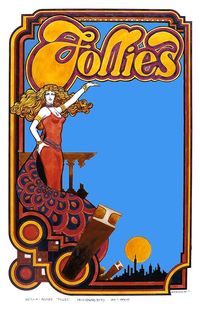They've dropped the "Kowalski" from Stanley's name in new Streetcar revival
#50A middle aged streetcar
Posted: 4/2/12 at 10:17pmI admit, I'd love for someone to do something similar to the current Salesman and restore Mielzener's iconic set (which influenced so much of the final script of the play) and Lehman Engel's incidental music (although I suppose people now associate the piece more with Alex North's film music).
#51A middle aged streetcar
Posted: 4/2/12 at 10:19pm
I guess I never found the plantation in "Streetcar" to actually be about so much real estate and finance (in the way it certainly is in "Cat").
I think what matters is that the DuBois sisters are of a certain social level--though one that has decayed over the years--and Stanley is of another.
It sounds as though the Williams-approved modifications mentioned in that article would accomplish that. At least, sufficiently for me to go along with the story being told.
Dollypop
Broadway Legend Joined: 5/15/03
#52A middle aged streetcar
Posted: 4/2/12 at 10:21pm
I see plenty of dialogue having to be changed if "Kowalski" is dropped from the text. There's a moment when Blanche makes an unflattering comparison between Poles and the Irish, another when she first approaches the apartment and fumbles with her sister's married name and then, Stanley's famous line: "I am not a Polack. People from Poland are POLES."
If Pearl Bailey, who was not Irish, could play Dolly GALLAGHER Levi and Diana Sands could play Joan of Arc, then this cast of STREETCAR could perform the play without adjustments to the dialogue. If they're good, the audience will be looking past the color of their skin after the first 10 minutes of the play.
#53A middle aged streetcar
Posted: 4/2/12 at 10:53pm
Dollypop
1) Hello Dolly does not concern itself with race or ethnicity. In contrast, Streetcar, does, commensurate with the extent to which, as you note, there is "plenty of dialogue" referring to the subject.
2) If Hello Dolly was concerned with race - which it is not - and adapted to make Dolly an African American woman, there would be no need, as in Streetcar, to change or avoid her surname. Gallagher could easily be a slave name taken from an Irish master. Just as one would expect that the freed slaves of Tara would have taken the surname O'Hara post-bellum.
3) Saint Joan is a classic story involving a true life character, and Diana Sands's assaying the role is a completely different kind of event, a case of color-blind casting in which the audience is clearly aware that the African American actress playing the role is playing a historical French Caucasian. It requires a suspension of disbelief, akin to the one we make simply by watching Diana Sands speaking English while playing a person who spoke only French, or, in other contexts, watching actors sing and dance in what in the narrative is a nontheatrical situation, or watching people in Elizabethan plays speak in iambic pentameter. It's called theater.
4) And while we are on the general subject, Saint Joan deals with national identity. It does not even deal with national identity in the modern sense, although it might well be argued that The Hundred Years War was a milestone in the evolution of our modern understanding of nationhood. It certainly does not deal with race or ethnicity in any contemporary sense, particularly in the context of American culture at play in Streetcar. But to the extent that it deals with two royal powers, their armies and the Church, and a conflict of us versus them, the underlying political conflict of the setting is about national allegiances to crowns and the beginning of an understanding of what it is to be a nation. It is not about ethnicity. The English nobility of the time was largely of French Norman origins. The English and French royal families were blood relations. Which is the reason they were at war in the first place.
Updated On: 4/3/12 at 10:53 PM
#54A middle aged streetcar
Posted: 4/3/12 at 9:43am
Last night, I had a very lucky surprise and was allowed to attend the invited dress of STREETCAR. It was a very small affair and though I think the producers wanted to make sure it was a closed rehearsal, I hope they won't mind my leaking that this is well on its way to being a terrific production of the play.
The cast is uniformly excellent and any of the issues we had about the ages of the actors is really a non-event. I found them all believably age appropriate, especially Rubin-Vega who is so tiny on stage, she's almost child like.
For all the debate, as it turns out this is a surprisingly traditional production of the material; I'd say more traditional than even Liv Ullman's production at BAM (with Cate Blanchett).
The show does indeed cut the use of Kowalski and the term polack but as of right now doesn't replace those lines with compatible black references. The issue of race is much less present than I thought perhaps it would be.
There were of course some pacing issues etc that I'm sure will be ironed out in the coming weeks, but the show is already in very strong shape and I think could be a sleeper hit this season.
#55A middle aged streetcar
Posted: 4/3/12 at 9:58am
Glad to hear that, MB! Thanks! ![]()
As for my initial misgivings about Blair Underwood's age, those went out the window a couple of weeks ago when I ran into him at a Signature Theatre event and nearly buckled at the knees. Hot damn!! Man's on fire!!
#56A middle aged streetcar
Posted: 4/3/12 at 3:06pmAll good news. I saw rehearsal shots of Underwood only this morning, and he really doesn't look his age, and certainly appears in shape. My John C. Reilly concerns more or less vanished. I think I'll back off fretting about all of it, and just buy a ticket. Hearing MB's report that it's a straightforward production makes me doubly curious.
#57A middle aged streetcar
Posted: 4/3/12 at 3:25pm
Reginald, I'm just reading back through the thread and your last comment about Belle Reve is really astute, because watching the play last night I realized how little is actually ever said about the house. It's never referred to as a plantation, and in fact the only person who describes it at all is Stanley. True he says it was a 'big house with columns' but he also describes Blanche's tiara as having real diamonds, so his opinion must be taken with a grain of salt.
Though its easy to make the assumption that Belle Reve might be interchangable with Big Daddy Pollitt's estate, there isn't anything in the script of STREETCAR to necessarily support that.
"Belle Reve" also roughly translates to 'sweet dream' or 'sweet fantasy' which could also be Williams' own way of pitting Blanche against her own false illusions and the myth of the old south. I've certainly known people from that part of the country who have spoken about their family histories/estates as if they were something out of GONE WITH THE WIND, when a lot of the houses in that area were just glorified farm houses.
Updated On: 4/3/12 at 03:25 PM
#58A middle aged streetcar
Posted: 4/3/12 at 3:44pm

Also, incidental to the production, but hopefully another good sign — in a season of routinely terrible poster art, this is stunning.
#59A middle aged streetcar
Posted: 4/3/12 at 4:16pm
Do those of you who think of Belle Reve as a Williams version of Twelve Oaks or Mount Vernon feel the same way about the house where young Amanda Wingfield received her gentlemen callers?
I never have pictured anything nearly so grand. But rather a genteel southern home like Frankie's in Member of the Wedding, Miss Alma's in Summer and Smoke, or more precisely because it's more outside of town, Skeeter's in The Help. I agree that the property having a name, like the gleam of Blanche's jewelry, means something very different to Stanley and Blanche than it does to Stella's - in this respect - clearer head.
Gaveston2
Broadway Legend Joined: 6/28/11
#60A middle aged streetcar
Posted: 4/3/12 at 4:19pm
"Belle Reve" also roughly translates to 'sweet dream' or 'sweet fantasy' which could also be Williams' own way of pitting Blanche against her own false illusions and the myth of the old south. I've certainly known people from that part of the country who have spoken about their family histories/estates as if they were something out of GONE WITH THE WIND, when a lot of the houses in that area were just glorified farm houses.
And if so, Williams would have had his own mother as a model. She was actually a pastor's daughter from Ohio, but according to Williams, became the biggest belle in Mississippi when her father was transferred there.
Blanche does have her speech about how the land was lost, piece by piece over centuries, to pay for the "epic fornications" of her ancestors; and she has the paperwork to prove it! So I doubt Belle Rive is merely a fantasy, but it may not have been the Tara we envision from GONE WITH THE WIND.
And at the time the play was set, African Americans were holding their own debutante balls in Atlanta; I'm sure New Orleans had its equivalent. THE HELP notwithstanding, not all black people were domestics in the post-war South.
#61A middle aged streetcar
Posted: 4/3/12 at 4:40pm
Oh I don't argue that Belle Reve likely once sat on a great deal of land (most houses in that area did) but agree the semantics of the grandeur of the place are debatable. Speaking of Gone with the Wind, Margaret Mitchell supposedly rolled her eyes at the depiction of both Tara and (especially) Twelve Oaks in the film as she knew mansions like that were a total fantasy of the old south and pretty unrealistic historically.
Laurel Mississippi was also pretty rural in the 1800s. I think if Williams in some way really meant for Belle Reve to have been an especially genteel plantation, he would have would have picked a location closer to Natchez or Vicksburg. The plantation in CAT ON A HOT TIN ROOF, for comparison is specifically stated in the text of the play to be in the Mississippi Delta, which is where most of the major homes we associate with southern aristocracy are located.
Updated On: 4/3/12 at 04:40 PM
Gaveston2
Broadway Legend Joined: 6/28/11
#62A middle aged streetcar
Posted: 4/3/12 at 5:01pm
I'm sorry, Michael. I was just thinking out loud and didn't mean to seem to pick at your argument.
You are absolutely right that our MGM-inspired images of antebellum grandeur really only existed in places like Virginia and South Carolina, where the soil was rich and Europeans had been in residence for centuries.
One should read Faulkner's Absalom! Absalom! for a picture of life in the first generation of European settlement. It is a much truer picture of life in Northern Georgia, Alabama and Mississippi than the film of GWTW. In her novel, Mitchell goes out of her way to stress that the Scarlett's father is first-generation American and carved Tara out of the wilderness. The film's image of acres of freshly mown lawns was very unlikely.
I'm glad to hear your report on the rehearsal and very pleased that this discussion appears here. Williams' dramatization of his socio-economic contexts was every bit as carefully observed as Faulkner's; but Blanche and Cat and some of his other characters became so iconic on film that we forget they were born as realistic characters with detailed backgrounds.
#63A middle aged streetcar
Posted: 4/3/12 at 5:10pmMichael Bennett, do you really think that if black landowners lost their estate in the time period of STREETCAR (and the implied period of its backstory), it wouldn't be discussed by the characters in terms of race at all? That doesn't make sense to me.
#64A middle aged streetcar
Posted: 4/3/12 at 5:17pm
Idiot, I'm not exactly sure that I understand your question. The land of Belle Reve apparently has been long gone. What Blanche loses is the house, although the way she describes the gradual chipping away of Belle Reve's legacy due to her ancestors' excesses and bad decisions, its not a stretch for me to imagine the house too had likely fallen into a state of some disrepair before being lost. For all we know, the house was a kind of Grey Gardens with Blanche living in near squalor on a school teacher's salary. But regardless, I don't really see how the question of race would necessarily come into the conversation.
Updated On: 4/3/12 at 05:17 PM
#65A middle aged streetcar
Posted: 4/3/12 at 5:31pm
Michael Bennett -- sorry. I always try to be brief on posts like this and clarity is sometimes lost.
What I'm pointing out is that, since it is an ancestral home, it would be a great point of pride that they, as black Americans in the period, possessed such a thing and the loss would cause specific emotion and specific conversation about having lost something that they would have been so proud of.
More simply put, it's inconceivable to me that the relevance of such an accomplishment for their family would have been overlooked in dialogue.
For the record, I've never pictured Belle Reve as anything but somewhat regal. I was raised in the South and don't think that meager properties were given names. I don't think that Blanche made up the name 'Belle Reve', I think that's what the estate was actually called. Being Southern as well, I don't think Williams thought it needed too much explanation. He meant to evoke a sizable property, or Stella would at some point say to Stanley something to the effect of, "Belle Reve is just a name my sister gave the house. There's really nothing so special about it."
Updated On: 4/3/12 at 05:31 PM
#66A middle aged streetcar
Posted: 4/3/12 at 5:59pm
Oh I agree that Belle Reve is an old family name for the house, but since Williams seems to have been deliberately vague in the details of Belle Reeve the level of the homes quality, size or gentility is really all conjecture and I think more open to this kind of interpretation. Ive also seen named plantation homes in the south that are completely unimpressive. I think if the details of Blanche's true heritage were more important to the story, Williams would have included more conversation about it. Big Daddy speaks at length about the heritage of the house in CAT, which I think makes that play more of a stretch in terms of accuracy when performed by a black cast, but I don't see that same issue in STREETCAR.
Updated On: 4/3/12 at 05:59 PM
#67A middle aged streetcar
Posted: 4/3/12 at 6:50pm
I don't understand why casting black actors requires it to become a different play, one that illumines the economic landscape of the characters.
There was once a big house and now it's gone. But beyond that, I never gave a thought to the calibration of the loss over the years, or how the DuBois family acquired and lost their property. I didn't when the actors were white, and I don't think I'd react differently if they were black.
It's just not that kind of play to me.
Updated On: 4/3/12 at 06:50 PM
#68A middle aged streetcar
Posted: 4/3/12 at 8:46pm
Cleopatra Jones, Carmen Jones, The Emperor Jones, Franklin D. Roosevelt Jones, Stanley Jones. What's the problem?
Will Blanche's new name be Noir?
Gaveston2
Broadway Legend Joined: 6/28/11
#69A middle aged streetcar
Posted: 4/3/12 at 8:46pm
I understand Idiot's point about race and the loss of a large African-American estate. But part of what drives the plot is Blanche's general refusal to discuss what happened to Belle Reve. This is a big part of why Stanley finds her suspicious.
So it's not as if this production will include a lengthy discussion of the loss of property either. The loss of Belle Reve represents the passing of a way of agricultural life that could not support itself (even with slave labor, much less without it) and has been in decline since before the Civil War. That is equally true whether the owners are white or black.
***
Reginald is certainly right that one can enjoy the play as a psychological struggle (it is a play about a family, after all) and ignore the socio-political underpinnings. Personally, I like the way Williams grounds the war for Stella's soul (which is the basic conflict) in such a way that it stands in for larger socio-economic trends. It sounds as if this production has found a way to make that just as true for an African-American family.
#70A middle aged streetcar
Posted: 4/3/12 at 9:13pm
This has been an interesting discussion. However, I think all of us - myself included - in our zeal to challenge and defend the changes at issue tend to forget that while ethnic and class division and loss of wealth and status (among many other things that make up the brilliant fabric of Streetcar) are important elements, at the play's core is a powerful battle between a salt of the earth realist (in equal parts hypersensitive and brutal) and a romantic (in equal parts narcissistic and tender) who thrives on the magic of her illusions for the soul of an ordinary woman whom they each love, his wife and her sister.
Updated On: 4/3/12 at 09:13 PM
Gaveston2
Broadway Legend Joined: 6/28/11
#71A middle aged streetcar
Posted: 4/3/12 at 10:33pm
With all due respect, henrik, and with full acknowledgement that Williams paints the details so carefully (as great artists are apt to do) that his characters achieve an undeniably universal appeal, Blanche isn't just any romantic. She's a specific product of the great American romance that was the American South in the century following the Civil War. (Traces of it remain even today, but the end of Jim Crow and migration from the North have changed the region so much it isn't nearly the nation-within-a-nation it was when Williams first wrote the play.)
And Stanley could live anywhere, but his impatience with artifice is born specifically out of his post-war life in the New Orleans of magic, illusion and disillusion. Flores para los muertos, indeed!
Would you and Reginald argue that the impending revolution and the demise of the bourgeois class are irrelevant to The Three Sisters or The Cherry Orchard? I should hope not. The latter of course was adapted by Williams and moved to the American South, but he did so because he found similarities in the social contexts, not because those contexts didn't matter.
As I said above, yes, at its heart the play is a battle for Stella and the soul of the family, but that doesn't mean the family is any less specific than the family in Fences or A Raisin in the Sun
"The past is never dead. It isn't even past."
It's not a coincidence that a Southern writer wrote that famous quote. It describes an attitude that stood in opposition to traditional, American "can do" optimism, an attitude without which a Blanche DuBois is not possible.
#72A middle aged streetcar
Posted: 4/3/12 at 10:38pmDid anyone else see the first preview? I just got back, and race does indeed play much smaller a role in this production than I anticipated. It isn't even directly referenced, just alluded to.
nasty_khakis
Broadway Legend Joined: 3/15/07
#73A middle aged streetcar
Posted: 4/3/12 at 10:54pm
I just got back as well. While I still don't "buy" people of their race owning a great ancestral home during this time period race isn't an issue in the show, so the casting overall worked for me.
HOWEVER the audience tonight was cliche and similar to what I experienced at Fences and Cat on a Hot Tin Roof. Several people ate food all around me and many many people texted the entire show. The most heartbreaking thing to me was the humor misinterpretation. They seemed to laugh at very tragic and dark moments. For instance, when Mitch turns on the light to see Blanche everyone laughed at her scared reaction. I've only ever found this moment to be gut wrenching and to hear audience laugh irked me. The laughter building up to the rape also rubbed me the wrong way. It's not entirely the actor's fault, but it was an overall problem. Hopefully tonight's audience was a fluke and other audiences will be more respectful.
#74A middle aged streetcar
Posted: 4/3/12 at 10:57pm
I was uncomfortable with the laughter as well. People lost it over "I've always depended on the kindness of strangers." Did they not understand that it wasn't supposed to be funny?
Videos








